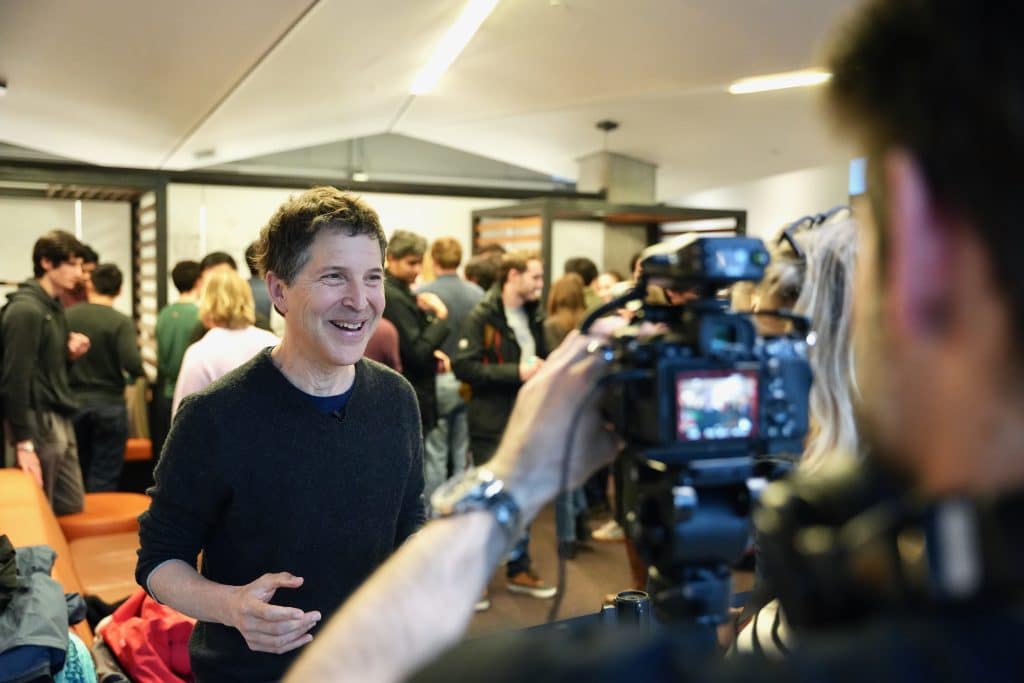As 2021 draws to a close, Cambridge Dictionary has revealed its word of the year: perseverance. Defined as “continued effort to do or achieve something, even when it’s difficult or takes a long time,” the word aptly captures the year. The global pandemic continues against a backdrop of widespread inequity and injustice. Devastating climate impacts await a more comprehensive global response. Consequential decisions threaten reproductive rights. And yet, we have seen concerted action due to the determination of many. The human capacity to persevere is awe-inspiring.
For the last half-century, the Packard Foundation has collaborated with grantee partners to solve local and global challenges to people and the planet. In 2021, we sought to be nimbler in supporting our partners. We provided more general operating support, more responsive grants, and acted with agility when opportunity was unlocked by crisis. There is so much more to do, but we are heartened by our collective ability to persevere in pursuit of a more just and equitable world. In that spirit, we share highlights of the past year’s awe-inspiring work.
Change for Today and Tomorrow
As we respond to immediate needs, we are also mindful of laying the groundwork for future change. From the global stage of vaccine distribution to climate change, from U.S. economic recovery and reproductive rights to community-led solutions in our local counties, the Foundation’s grantee partners worked to meet urgent and evolving needs now and into the future.
Supporting Global Capacity and Infrastructure
In 2021, we faced the stark challenges of global problems that demanded shared solutions as the COVID-19 pandemic and climate change crises dominated the year.
The good news of vaccine availability was dampened by the growing inequity of global vaccine distribution. Lower income countries with weak health systems were unable to access vaccines as wealthier countries hoarded available supplies. As the COVID-19 pandemic intensified in 2021, our long-standing partners in India, Indonesia, and Africa reported an urgent need for medical supplies and immediate assistance in their communities. The Foundation’s funding supported humanitarian efforts, strengthened infrastructure for vaccine distribution in these regions, and supported preparedness efforts to bolster responses in the face of new surges.
As the pandemic raged in northern India, PATH identified and fulfilled critical medical equipment needs at 20 nongovernmental healthcare facilities across the state of Bihar. In Indonesia, Lingkar Temu Kabupaten Lestari (LTKL) delivered 15,000 COVID-19 vaccine doses to Indigenous Peoples and local communities in remote villages.
As severe weather battered the globe, the release of the Intergovernmental Panel on Climate Change (IPCC) report underscored the criticality of urgent, collective action to reduce global carbon emissions. In preparation for this year’s United Nations Climate Change Conference, COP26, the Packard Foundation joined with governmental and philanthropic funding partners to commit a collective $1.7 billion to support the advancement of Indigenous Peoples’ and local communities’ tenure rights and forest guardianship. This allows the most effective land stewards to lead with solutions that help to safeguard the planet from climate change and biodiversity loss.
In addition, the Foundation provided support for the Global Methane Pledge, which aims to reduce methane emissions by at least 30% by 2030 and limit global warming to 0.2 ℃ by 2050. The Foundation joined more than 20 philanthropies which collectively committed $328 million to drastically reduce methane emissions globally and provide solutions to the growing crisis, including financial resources, technical support, and data to the more than 110 countries that signed the pledge. This first-of-its kind alliance demonstrates the essential role that global philanthropy plays – in close coordination with the private sector, civil society, and governments – in leveraging greater investment and action to address the impacts of climate change.
Laying the Groundwork Nationally for Immediate and Long-term Recovery
The pandemic underscored deep inequities in the U.S. Yet, the opportunity to provide recovery assistance offered a pathway to build more equitable social, health care, and economic systems. The American Rescue Plan Act (ARPA), signed into law in March of 2021, contained numerous provisions that, if made permanent, would significantly advance the health and economic status of children, women, and families in the U.S. that have been devastated by the ongoing COVID-19 pandemic.
The Foundation mobilized $20 million to support our partners working with local government agencies and community groups to ensure the equitable and effective distribution of ARPA funds. Our partners built on years of efforts and networks to quickly increase access to the Child Tax Credit through the creation of a mobile-friendly web portal that helped to reach the roughly 2.3 million children whose families earn too little to file taxes, but for whom the Child Tax Credit would provide much-needed support. These efforts have had a profound impact on families with many reporting that they were able to use the monthly payments for basic household expenses – diapers, food, clothing, shelter, utilities, and education.
The pandemic also exacerbated longstanding inequities in access to investment capital. The Foundation made mission investments to support alternatives to predatory payday and home lending practices while increasing lending to small businesses and community-based nonprofits. With a $25 million allocation to Community Development Financial Institutions (CDFIs) and other organizations addressing racial equity credit gaps in the U.S., the Foundation sought to make more capital available to communities of color who have long been excluded from financing opportunities. This effort included a $5 million loan to Oweesta, a CDFI intermediary creating and stabilizing small business and housing opportunities for Native communities throughout the U.S. as they recover and rebuild from the pandemic.
The Packard Foundation is committed to building a world where everyone can make decisions about their bodies and lives. This includes ensuring all people can access essential health care, including abortion care. This year marked a pivotal and sobering moment for reproductive rights in the U.S. with an unprecedented number of abortion restrictions enacted and a proposed ban in Mississippi that could overturn Roe v. Wade. Amid this backdrop, the Foundation continued to fund national and state-based advocates who are challenging restrictive bans, while ensuring women can meet their reproductive health needs now and into the future.
Funding Trusted Local Leaders to Develop and Implement Solutions
Close to home, the Foundation supported solutions developed and implemented by trusted leaders in Monterey County where COVID-19 infections, hospitalizations, and death rates had a disproportionate impact on Hispanic, Latino, Indigenous, and immigrant workers who play a critical role within the county’s economy. Community health workers were essential, providing their community with up-to-date information about how to stop the spread of the virus, connecting people with resources such as food, housing, and cash assistance, and securing COVID-19 testing and vaccination appointments.
This has also been a reflective year for the Packard Foundation as we embarked on a strategic planning process to ensure we are meeting the moment of multiple crises and rapid change. We look forward to sharing more details in the new year about how we continue to evolve to be an organization best equipped to meet current and future challenges. As we contemplate the year and our many years of partnership, we are once again struck by the power of your actions as you catalyze change locally, nationally, and globally. We are honored to be in partnership with you and look forward to a year ahead of continued perseverance and a collectively forged pathway to a more just and equitable world.








